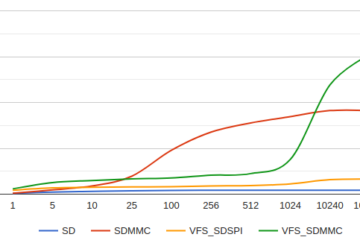I was measuring the speed of the analogWrite() on an STM32 Black Pill on some PWM pins and I was getting a result of around 48697 samples per second. This is enough for one line of hifi data: but I wanted to provide at least 4 channels!
This is not good enough: so I generated some new code with 4 PWM output pins using the STMCubeIDE and measured how many duty cycle updates we can do on these 4 channel: I was getting more the 1.2 millions!
This seems to be a much better option. Next I tried to do the same in the STM32 Arduino Timer API and integrated this into my PWMAudioStream version for the STM32: I was using the TIM2 to generate the PWM and TIM3 for driving the sample rate.
Finally, here is an example sketch that tests with 2 output channels:
#include "AudioTools.h"
int channels = 2;
uint16_t sample_rate=44200;
SineWaveGenerator<int16_t> sineWave(32000); // subclass of SoundGenerator with max amplitude of 32000
GeneratedSoundStream<int16_t> sound(sineWave); // Stream generated from sine wave
PWMAudioStream pwm; // Analog output simulated by PWM
StreamCopy copier(pwm, sound); // copy in to out
void setup() {
Serial.begin(115200);
AudioLogger::instance().begin(Serial, AudioLogger::Warning);
// setup sine wave
sineWave.begin(channels, sample_rate, N_B4);
// setup PWM output
auto config = pwm.defaultConfig();
config.sample_rate = sample_rate;
config.channels = channels;
pwm.begin(config);
}
void loop(){
copier.copy();
}
The output goes to the pins PA0, PA1 and to PA2 and PA3 if we would use all 4 channels.



0 Comments